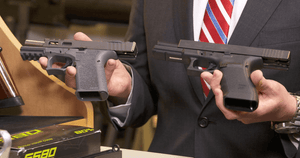Introduction
Ghost guns have become a hot topic in recent years, but the concept is far from new. Since the foundation of the United States, citizens have had the legal right to build their own firearms at home.
Advances in technology have made homemade guns more accessible. So, what does the rise of ghost guns mean for gun enthusiasts and hobbyists? It means greater control over how they customize their firearms.
Many experts and gunsmiths view ghost guns as the latest chapter in firearm innovation. Today, gun enthusiasts can use 3D printing, DIY firearm kits, and plans to assemble firearms without serial numbers.
With this accessibility comes the need to understand how ghost guns fit into the broader context of firearm regulations. While they are legal for personal use, it’s important to understand what defines a ghost gun and how untraceable firearms fit into today’s complex legal landscape.
That’s why it’s important for hobbyists and responsible gun owners to stay informed about the laws surrounding homemade firearms. As you know, with great power comes great responsibility.
In this article, we’ll explore what ghost guns are, how they’re made, and their legal status across different states in the U.S.
What Are Ghost Guns?
Ghost guns are homemade firearms that don’t have serial numbers. This is what sets them apart from the typical firearms you’d buy from a store. A serial number is essentially a unique code that manufacturers stamp on guns to track ownership and sales.
Without this serial number, ghost guns are considered untraceable firearms, meaning they can’t be tracked by law enforcement. If you build a homemade firearm and add a serial number, it’s no longer classified as a ghost gun. In many areas, these serialized firearms face fewer legal restrictions, similar to commercially made guns.
By definition, ghost guns aren’t the same as zip guns. Zip guns are improvised, low-quality firearms, while ghost guns are built from reliable parts with more precision and safety.
Ghost guns are usually assembled from unfinished parts, like an 80% lower receiver, which we’ll cover later in this article. People often use DIY kits or 3D printing technology to make them, which is why the term “DIY firearms” is often used when talking about ghost guns.
Why People Build Ghost Guns
For many specialized gun enthusiasts, ghost guns offer the chance to customize firearms exactly how they want. When you build a firearm from scratch, you get to choose every part to match your preferences, whether it's the grip, barrel length, or other features.
For hobbyists, ghost guns mean a hands-on way to dive into gunsmithing, learning how each component works while creating something unique.
Ghost guns are also popular for home defense. Since you’re building it yourself, you can tailor the firearm to your personal defense needs. This level of flexibility is a big reason why many choose to build their own guns.
While gun control advocates have raised concerns about ghost guns being untraceable, we won’t dive into those debates here. Since this is for law-abiding citizens who are legitimately interested in homemade firearms, we’ll focus on the legal aspects and how responsible gun owners can stay informed.
Legal Aspects of Ghost Guns
Are ghost guns legal in the US? On a federal level, yes—ghost guns are legal to build for personal use, as long as you’re not planning to sell them and you’re legally allowed to own a firearm. However, because ghost guns don’t have serial numbers, they fall into a gray area in some states.
While it’s legal to build a ghost gun for yourself, selling or distributing one is a completely different story. To legally sell a ghost gun, it would need to have a serial number and comply with federal and state regulations, just like any other firearm.
Once a homemade firearm is serialized, it means it is no longer a ghost gun.
Let’s take a look at where ghost guns are allowed and where specific regulations have been introduced.
States with No Specific Regulations on Ghost Guns
In 33 states, ghost guns are generally allowed as long as they comply with federal laws:
- Alabama
- Alaska
- Arizona
- Arkansas
- Florida
- Georgia
- Idaho
- Indiana
- Iowa
- Kansas
- Kentucky
- Louisiana
- Maine
- Michigan
- Minnesota
- Mississippi
- Missouri
- Montana
- Nebraska
- New Hampshire
- New Mexico
- North Carolina
- North Dakota
- Ohio
- Oklahoma
- Pennsylvania
- South Carolina
- South Dakota
- Tennessee
- Texas
- Utah
- West Virginia
- Wisconsin Wyoming
States That Regulate Ghost Guns

The following 16 states have implemented regulations on ghost guns:
- California: Requires serial numbers and background checks for component parts; all ghost guns must be reported to officials.
- Colorado: Mandates serial numbers for all firearm components.
- Connecticut: Requires serial numbers and background checks for component parts; ghost guns must be registered, and plastic, undetectable guns are banned.
- Delaware: Enforces serial numbers and background checks; bans plastic, undetectable guns, 3D-printed firearms, and sharing 3D printing instructions.
- Hawaii: Requires serial numbers and background checks for components; prohibits 3D-printed guns and mandates reporting of ghost guns.
- Illinois: Serial numbers and background checks are required for all firearms and their components.
- Maryland: Enforces serial numbers and background checks; ghost guns must be reported to officials.
- Massachusetts: Requires serial numbers and background checks; ghost guns must be registered with authorities.
- Nevada: Enforces serial numbers and background checks for component parts.
- New Jersey: Serial numbers and background checks are required for parts; bans 3D printing of firearms, plastic, undetectable guns, and sharing 3D printing instructions.
- New York: Serial numbers and background checks for parts; bans plastic, undetectable firearms.
- Oregon: Prohibits undetectable firearms, including 3D-printed guns; requires all frames and receivers to have serial numbers.
- Rhode Island: Requires serial numbers and background checks; bans 3D-printed firearms.
- Vermont: Serial numbers and background checks are mandatory for all firearms and parts.
- Virginia: Bans plastic, undetectable firearms.
- Washington: Requires serial numbers and background checks for components; bans plastic, undetectable guns.
Can a Ghost Gun be registered?
Yes, a ghost gun can be registered. As soon as a homemade gun is serialized, it’s no longer considered a ghost gun.
That said, registering a ghost gun is not as simple as registering a store-bought firearm. To register a homemade firearm, it first needs a serial number. This usually means taking the gun to a licensed gunsmith or manufacturer who can engrave a unique serial number onto it.
Once the serial number is added, the next step would be to file the necessary paperwork with the appropriate authorities. This process varies by state but typically involves submitting details about the firearm and the new serial number to local or federal agencies for official registration.
Components and How They Are Made
At 45 Blast, we’re all about supporting gun enthusiasts who enjoy customizing their firearms. We understand the appeal of crafting something unique, just like we do with each gun compensator we have in store.
Like any handgun, building a ghost gun involves assembling several key parts. These include the upper receiver, barrel, stock, trigger, magazine, sights, firing pin, spring, and other small components. All of these components can be purchased individually or in kits, often online. Some gun enthusiasts even use 3D printing to create custom parts, offering endless possibilities for customization.
But when it comes to ghost guns, one of the most important components is the lower receiver. So, let’s take a closer look at what an 80% receiver means.
What is an 80% Receiver?
An 80% receiver, or "80 percenter," is an unfinished lower receiver. Since it’s not complete, it isn’t considered a firearm under federal law, so it can be sold without a serial number or background check.
To finish an 80% receiver, you’ll need to drill and mill certain areas, like the fire control group. Once complete, it becomes a fully functional firearm and may need to be serialized depending on local laws.
Impact on the Firearm Industry
Firearms have been a part of American history since the beginning, evolving from early muskets to modern, high-tech guns. With advancements in technology, the ability to customize firearms has grown, and homemade guns have become a natural extension of that.
At 45 Blast, we’re all about responsible gun ownership. We believe that building firearms at home comes with the responsibility of staying informed and safe. For more on this, check out our gun safety guide blog post to ensure you're following best practices.
For gun enthusiasts, building firearms at home offers more control and creativity. DIY firearms, including ghost guns, reflect this growing trend of personalization in the gun world. However, this rise has also sparked debates about safety and regulations, as untraceable guns challenge traditional rules.
In many ways, homemade guns are the latest chapter in the evolution of firearms, pushing the industry into new territory.
Now, let’s take a look at what two of the most relevant firearm industry organizations have to say about ghost guns:
NSSF about Ghost Guns
The National Shooting Sports Foundation (NSSF) has a clear stance on ghost guns. According to the NSSF, homemade firearms are legal under federal law, as long as they’re built for personal use. In fact, they note that people have been making their own guns at home for years, long before the term "ghost gun" came into use.
The NSSF highlights that most people building these guns are hobbyists or gunsmiths who enjoy customizing their firearms. These are typically responsible gun owners who follow safety and legal guidelines.
At the same time, the NSSF recognizes concerns over ghost guns being untraceable. Instead of pushing for new regulations, they advocate for enforcing existing laws to prevent illegal activities.
NRA About Ghost Guns
The National Rifle Association (NRA) strongly supports the right of individuals to build their own firearms. According to the NRA, people have been making their own guns since before the United States was founded, and they see no reason why law-abiding citizens should be prevented from doing so today.
In a statement to ABC11, the NRA emphasized that the focus should be on enforcing existing laws to target criminal activity:
"If federal, state, and local governments are interested in making their communities safer, they should enforce the laws on the books and arrest and prosecute criminals who break the law."
As long as safety and legal guidelines are followed, the customization and innovation that ghost guns represent continue to play a role in the firearm industry.
Conclusion
As we mentioned at the beginning, as technology has evolved, the process of making ghost guns has become easier and more customizable for gun enthusiasts.
To wrap up—are ghost guns legal in the US? Yes, for personal use. However, it’s not legal to sell or distribute unserialized guns.
We’ve covered what ghost guns are, their legal status, and how 80% receivers play a central role. For those who enjoy the hands-on experience of building firearms, it’s important to stay informed about the laws and responsibilities that come with it.
So, as we always say, enjoy the process, and we’ll see you at the range.


